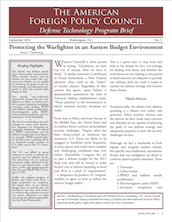On September 24, AFPC hosted Mr. David Trachtenberg on Capitol Hill for a briefing, entitled “Protecting the War-fighter in an Austere Budget Environment,” as part of AFPC’s lunchtime briefing series devoted to security and defense education for Congressional Staff in the House and Senate.
Trachtenberg, an independent consultant in national security affairs and is the President/Chief Executive Officer of Shortwaver Consulting, discussed this issue expertly, incorporating his public policy experience of more than 30 years. With experience in both the private and public sectors, Trachtenberg has held the positions of the Principal Deputy Assistant Secretary of Defense for International Security Policy, Acting Deputy Assistant Secretary of Defense for Forces Policy, and as a senior professional staff member on the House Armed Services Committee (HASC).
In his remarks, Trachtenberg emphasized the importance of defense technology and continued funding in protecting our warfighters, and more broadly, U.S. defense strategy. Trachtenberg highlighted the non-traditional, asymmetric threats that our warfighters are increasingly likely to confront in the future and proposed policy options for mitigating each of these threats.
More specifically, these five threats included terrorism, cyber warfare, WMD and ballistic missile proliferation, electromagnetic pulse (EMP), and increased complexity and “urbanization” of the battlefield for the significant impact that each of these will have on the ability of our warfighters to execute their missions successfully. However, Trachtenberg argued that in order to successfully address these threats, Congress needs to approve additional fiscal resources, even in a time of budget austerity.
Trachtenberg contended that defense is discretionary funding; therefore, spending more on defense is simply a matter of being willing to spend less on something else. Strategy should inform budgets, not the other way around. In a global environment of increasingly sinister threats, the United States cannot simply walk away from its commitments.
Trachtenberg concluded his remarks with the hope that Congress will overturn the sequester once and for all with a focus on protecting the warfighter against non-traditional and asymmetric threats, requiring sufficient funding to fulfill U.S. responsibilities both as a global leader and a force for peace.
To access the full report based on the speakers comments, please read the downloadable file below.

